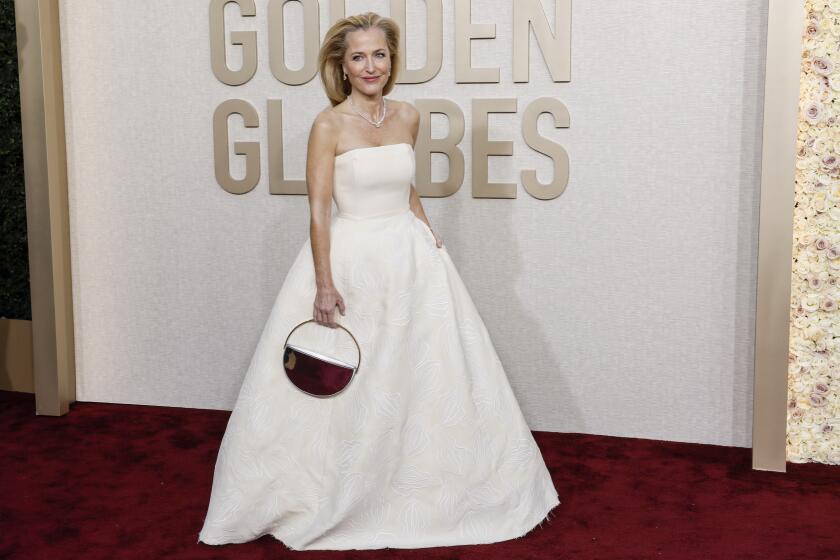Commentary: Of the Golden Globe nominees, ‘Small Axe’ is the one to catch up on first. Here’s why
Much has been written about Golden Globe voters’ love of British TV. This, however, is not that story. This is an ode to miniseries or TV movie nominee “Small Axe,” a wholly fresh and original U.K. series that has nothing to do with that higher-profile Commonwealth contender, “The Crown.”
Far from sipping tea at the royal palace, director Steve McQueen’s five-part anthology cooks goat curry with London’s Afro-Caribbean community, chronicling the flip side of British colonialism and the evolution of Black identity in the metropole through the personal journeys of the people it follows.
Set between the 1960s and the 1980s, each episode of this Amazon Prime Video series is a feature-length film unto itself, varying in style and tone but connected by themes of community, family, assimilation, culture clash, racism and music. Lots of music. New decades bring new styles and soundtracks, as well as fresh signs of progress — and new problems. But at the core of it all are the people whose lives are enriched and upended by a society that wasn’t designed with them in mind.
The intimate “Small Axe” weaves their stories around the empire’s history of racism, the rigors of assimilation and the conflict that arises between immigrant parents and their English-born kids. The personal is political when discrimination means these sympathetic figure sbrutalized by police, shunned by prospective employers and labeled “low intelligence” by a biased school system. In several episodes of the series, they become characters in historical court cases — the 1971 trial of the Mangrove Nine, which led to the acknowledgment of racism within Scotland Yard — and uprisings — the 1981 Brixton riot against racist police.
Inside the virtual vote from the L.A. Film Critics, in which Amazon’s anthology film series ‘Small Axe’ took best picture of 2020.
What sets “Small Axe” apart is its ability to mine humanity and empathy from the smallest details: There’s the graceful swirl of smoke off the hand-rolled cigarette of a troubled soul. Or the bamboo-patterned wallpaper in a Caribbean family’s residence, juxtaposed with the cold British weather outside as if to suggest how far they are from the place they once called home.
The series captures a slice of life seldom seen onscreen, that of first-generation immigrants from former British colonies such as Trinidad and Guyana, Jamaica and Grenada, which gained their independence during the decades depicted in “Small Axe.” Those eager to start a new life elsewhere are part of the Windrush generation that flocked to Britain after World War II — named after the former German ocean liner the initial wave arrived on — and were later recognized as legal permanent residents under a 1971 immigration act. The thick patois of characters throughout the series may require some American viewers to use closed captioning. But their offspring are a different story: They grew up consuming British culture, even while being pushed to its margins.
Though there’s plenty of strife in “Small Axe,” moments of beauty are pulled from the commonplace and amplified into indelible cinema. The strength and fragility of older folks as they sway to Jim Reeves’ songs at the ’60s-era Mangrove cafe. The hormones, hopes and angst of young revelers at an ’80s house party, their precarious journey into adulthood captured in quick, unsure glances between prospective lovers or a bead of sweat running down a young man’s neck. A bright boy’s fascination with the stars is a celestial escape from a discriminatory school system that’s labeled him and other Black kids of Caribbean descent “educationally subnormal.”
McQueen was born in 1969 to Caribbean parents and much of “Small Axe” feels like a memory in the best sense. The director, whose “12 Years a Slave” won the 2014 Oscar for best picture, pulls from his own childhood, the stories of others, historical events and imagined characters to create the series’ vision of West Indies London. “Mangrove” tracks the true stories of the defendants in a case against the police. “Red, White and Blue” retells a young scientist’s decision to become a cop after his father is brutally beaten by law enforcement. “Alex Wheatle” follows the story of the British novelist who was imprisoned after the Brixton uprising. “Lovers Rock” is a whimsical trip to an ’80s blues party, while “Education” follows a fictional boy’s journey through a segregated school system.
The re-creation of long-gone communities in Notting Hill and Brixton, before housing booms and gentrification, is perhaps one of the more impressive feats in “Small Axe.” They look and feel as they might well have back then, the sounds of reggae, ska, dub and pop mixing with the sounds of men gathering at a local club and women chatting at the corner store. The streets are populated with Vauxhall Victors and Ford Cortinas, the sidewalks inhabited by men in vintage plaid coats and women in platforms. These renditions of the city aren’t kitschy; they’re artful reconstructions of bittersweet memories.
Dennis Bovell wrote “Silly Games” after watching a TV ad for a cassette tape. Forty-plus years on, it’s the heart of Steve McQueen’s “Lovers Rock.”
“Education,” one of two fictional stories in the series, is the closest to a biographical tale. Set in the 1970s, it follows 12-year-old Kingsley (Kenyah Sandy), a bright boy who is deemed “educationally subnormal” after scoring low on a culturally biased I.Q. test. He is sent to a “special” school. His mother (Sharlene Whyte) has a hard time believing that the education system could be that racist. But as history has shown, it was. McQueen has since revealed in interviews that he was one of those kids.
“Lovers Rock,” named after a romantic reggae subgenre, is all about the dance floor at an early-’80s house party in Notting Hill. Fat spliffs, rum and lager abound in this nearly plotless, 70-minute joy ride through a feeling and time as revelers dance to the Revolutionaries’ “Kunta Kinte Dub,” Pat Kelly’s “How Long Will It Take” and the Carl Douglas classic “Kung Fu Fighting.”
Music plays a big role in “Small Axe” and the soundtrack alone deserves an award, from Toots and the Maytals to Sister Sledge, Cry Tuff & The Originals to, well, Jim Reeves.
It’s no coincidence that the series shares the same name as a Bob Marley and the Wailers song. “If you are the big tree / We are the small axe / Ready to cut you down,” Marley sang in 1971. Both are derived from a Jamaican proverb and the promise of equality. McQueen’s series is the next step in that revolution.
More to Read
The complete guide to home viewing
Get Screen Gab for everything about the TV shows and streaming movies everyone’s talking about.
You may occasionally receive promotional content from the Los Angeles Times.







